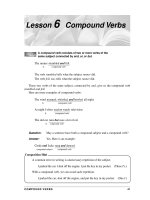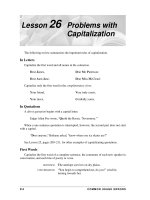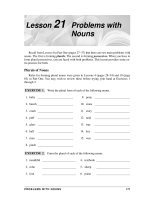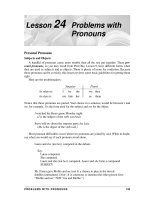Grammar And Usage For Better Writing - The supbject
Bạn đang xem bản rút gọn của tài liệu. Xem và tải ngay bản đầy đủ của tài liệu tại đây (48.63 KB, 19 trang )
THE SUBJECT 3
Lesson
1
The Subject
A sentence has two parts: (1) a subject and (2) a predicate. This lesson deals with the
subject.
The subject is the part of the sentence about which
something is told or asked.
The seats on the bus are very comfortable.
QUESTION
: About what is the sentence telling something?
ANSWER
: The seats on the bus.
SUBJECT
: The seats on the bus.
Amelia Earhart disappeared over the Pacific.
QUESTION
: About whom is the sentence telling something?
ANSWER
: Amelia Earhart.
SUBJECT
: Amelia Earhart.
Has your brother Tom found a summer job?
QUESTION
: About whom is the sentence asking something?
ANSWER
: your brother Tom.
SUBJECT
: your brother Tom.
Position of the Subject
The subject is usually found at the beginning of the sentence, but it can also appear in
other positions.
SUBJECT AT THE BEGINNING OF THE SENTENCE
:
An experienced pilot was at the controls at the time of the crash.
SUBJECT AT THE END OF THE SENTENCE
:
At the controls at the time of the crash was an experienced pilot.
4 PARTS OF SPEECH
SUBJECT WITHIN THE SENTENCE
:
At the time of the crash, an experienced pilot was at the controls.
Finding the Subject
A sure way to find the subject is to answer one or the other of these questions:
• About whom or about what is the sentence saying or asking something?
• Who or what is doing, or has done, or will do something?
Question 1:
What is the subject of the following sentence?
The score at the end of the quarter was 12–12.
Procedure:
Ask yourself: “About what is the sentence saying something?”
Obviously, The score at the end of the quarter.
Answer:
The subject is The score at the end of the quarter.
(The subject tells about what the sentence is saying something.)
Question 2:
What is the subject of the following sentence?
The orchestra members tuned their instruments.
Procedure:
Ask yourself: “Who did something?”
Answer:
The subject is The orchestra members.
(The subject tells who did something.)
Question 3:
What is the subject of the following?
Wait outside, please.
Procedure:
Ask yourself: “Who is to wait outside?”
Answer:
The subject is You (understood).
(You) wait outside, please.
Note:
In an imperative sentence (a sentence expressing a command or mak-
ing a request), the subject You is not expressed but understood.
Question 4:
What is the subject of the following?
Is the door to the basement locked?
Procedure:
Ask yourself: “Is what locked?”
Answer:
The subject is the door to the basement.
(The subject tells about what the sentence is asking something.)
THE SUBJECT 5
EXERCISE 1.
Write the subject in the space provided.
Sample:
The apples in the fruit bowl were all sour.
The apples in the fruit bowl
1. Next to the hardware store is a ski shop.
2. Will your father drive us to the game?
3. Is the noise from the next room bothering you?
4. Our math teacher coaches the bowling team.
5. The bowling team is coached by our math teacher.
Simple Subject and Complete Subject
When a subject consists of more than one word, the main
word in that subject is called the simple subject.
The seats on the bus are very comfortable.
SIMPLE SUBJECT
: seats
The simple subject and the words that describe it are to-
gether known as the complete subject.
COMPLETE SUBJECT
: The seats on the bus
Question:
Does a simple subject ever consist of more than one word?
Answer:
Yes, especially if it is a name. For example:
The late Amelia Earhart was a pioneer in aviation.
COMPLETE SUBJECT
: The late Amelia Earhart
SIMPLE SUBJECT
: Amelia Earhart
EXERCISE 2.
Write the complete subject in the C.S. space and the simple subject in
the S.S. space.
Sample:
The first reporters on the scene did not get all the facts.
C.S. . S.S.
Hint:
You can be sure that you have correctly chosen the simple subject if you can prove
to yourself that it cannot be omitted. If The, first, and on the scene were omitted
from the C.S., above, the sentence would still make sense. But if reporters were
omitted, the sentence would not make sense. This proves that reporters is the sim-
ple subject.
1. The famous Mona Lisa is a painting by Leonardo da Vinci.
C.S. . S.S.
2. Did a letter from your sister come this morning?
C.S. . S.S.
3. Farther up on the hill is a house with white shutters.
C.S. . S.S.
4. Asleep in the crib was a six-month-old baby.
C.S. . S.S.
5. My older brother is graduating in June.
C.S. . S.S.
reporters
The first reporters on the scene
6 PARTS OF SPEECH
THE PREDICATE 7
Before we talk about the predicate, remember that
The subject is the part of the sentence about which
something is told or asked.
Prices are higher.
subject
What Is the Predicate?
The predicate is the part of the sentence that tells or asks
something about the subject.
Prices .
predicate
You can easily find the subject and the predicate of a sentence by asking two simple
questions:
Prices are higher.
QUESTION
1: About what is the sentence telling something?
ANSWER
: Prices.
The subject is Prices.
QUESTION
2: What is the sentence saying about Prices?
ANSWER
: Prices are higher.
The predicate is
My sister Karen is waiting for us.
QUESTION
1: About whom is the sentence telling something?
ANSWER
: My sister Karen.
The subject is My sister Karen.
are higher.
are higher
Lesson
2
The Predicate
QUESTION
2: What is the sentence saying about My sister Karen?
ANSWER
: My sister Karen is waiting for us.
The predicate is
Was Andy angry?
QUESTION
1: About whom is the sentence asking something?
ANSWER
: Andy.
The subject is Andy.
QUESTION
2: What is the sentence asking about Andy?
ANSWER
: Was Andy angry?
The predicate is
Position of the Predicate
The predicate usually comes after the subject, but it can also appear in other positions.
PREDICATE AFTER THE SUBJECT
:
The parking lot
S. P.
PREDICATE BEFORE THE SUBJECT
:
the parking lot.
P. S.
PREDICATE PARTLY BEFORE AND PARTLY AFTER THE SUBJECT
:
Is the parking lot
P. S. P.
EXERCISE 1.
First draw a single line under the complete subject of the sentence.
Then, above the double line at the right, write the predicate.
Samples:
SUBJECT PREDICATE
The temperature dropped suddenly.
Has the plane landed?
Under the tree lay many rotting apples.
Under the tree lay
Has . . . landed
dropped suddenly
next to the stadium?
Next to the stadium is
is next to the stadium.
Was angry.
is waiting for us.
8 PARTS OF SPEECH
1. Has our teacher recovered from the flu?
2. Behind the wheel was my sister Maria.
3. How comfortable these new seats are!
4. Finally, the suspect surrendered to the
police.
5. A flock of seagulls landed on the beach.
EXERCISE 2.
Complete the sentence by adding a predicate.
Samples:
The apple
A speck of dust
1. The onion soup
2. Your suede jacket
3. Her new pen
4. The owner of the car
5. My desk at home
flew into my eye.
was not ripe.
THE PREDICATE 9









